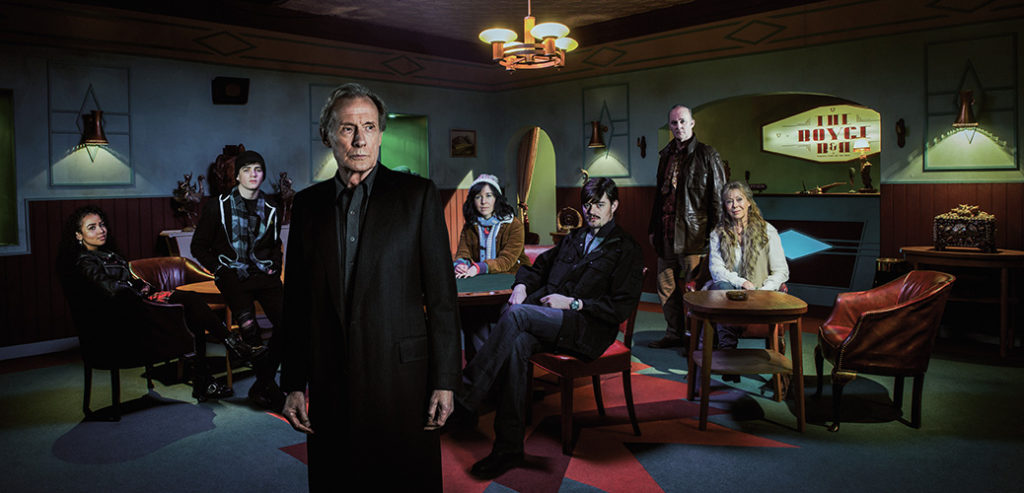Helen Tope reviews Sometimes Always Never, showing in our cinema until Wednesday 24 July.
Full of quirky detail, Sometimes Always Never begins with images scattered across the screen. Seventies décor, ornaments and games hint at an interior life, stuck firmly in the past.
We meet Alan (Bill Nighy) standing on a beach, making arrangements on the phone with his son. Irate and resentful, Peter (played by Sam Riley) reluctantly meets his father on the beach-front.
Their appointment, at a government building, is deferred, so they have to stay at a B&B overnight. In a set-up that feels very Wes Anderson, Alan and Peter discover they are not the only guests. Arthur (Tim McInnerny) and Margaret (Jenny Agutter) are sat in the lounge, nursing drinks. Alan, much to Peter’s irritation, suggests a game of Scrabble to fill the evening. Arthur, aloof and distracted, agrees after his wife insists. Arthur warns Alan that he is a champion gamer, and rather skilled at Scrabble. Alan accepts the challenge. As they begin to play, two-letter words – obscurities from the Greek alphabet – are spun out by both opponents. Master is playing Master. The scene ends with Alan not only winning the game, but a £200 bet he has secretly placed with Arthur.
The next morning, Alan and Peter travel to their appointment. It is a mortuary waiting room – they have been asked to identify a body that could possibly be Alan’s missing son, Michael. They arrive at the waiting room, to find Arthur and Margaret already there. They have been summoned for exactly the same reason. A missing son; the possibility that the body is his. Nighy goes to identify the body – which is not Michael’s – and as he re-enters the waiting room, Arthur and Margaret tighten, as they realise the odds have tipped against them.
Alan and Peter return home, but Alan is reluctant to head back to his own house, and asks to stay with his son for a few days. Recently retired, Alan is a man built up of quirks and eccentricities; the film leaves us to question which are real, and which are coping mechanisms, allowing Alan to endure a life of loose ends and cold trails.
His eldest son Michael has been missing for 30 years. Leaving abruptly during a game of Scrabble, Alan has remained frozen in time. Always searching – he has a ready batch of leaflets to place on car windscreens – Alan’s life is in the mire. His youngest son, Peter, has moved on – he is married with a son of his own. Peter’s relationship with his Dad has been damaged by the loss of Michael. Peter’s frustration (accurately laid down by Sam Riley) is that of a child being side-lined, as an enormous and unending tragedy unfolds. Unlike a bereavement, there is no finality or sense of closure. A gap remains.
Alan’s love of Scrabble, with its hard and finite rules (play the man, not the board), provides him with a sense of comfort. Playing an online game on Jack’s computer, he comes across a player, Skinny Thesaurus, who plays the word ‘zo’. It is the last word that Michael played before he left the family home. Alan watches how his opponent plays, and the strategy, the guile – it matches Michael’s style exactly. Alan becomes convinced that he has found his missing son.
Decidedly off-beat, this is a film that could only have been made in Britain. As defiantly British as the Windsor Knot, Sometimes Always Never doesn’t lose sight of its objectives, whilst dazzling us with style.
Written by screenwriter veteran Frank Cottrell-Boyce (The Railway, Goodbye Christopher Robin), the film’s dialogue allows for pause and silence. It is a small point, but worth making. Where other film-makers would rush to fill the void, Cottrell-Boyce gives the narrative room to breathe. It also gives the actors a chance to delve deeper into their characters. Nighy, usually providing the industry standard for the stiff upper lip, here lets Alan’s pain travel across his face. Nighy signposts his anguish not in big, declarative moments, but sitting and staring at a computer screen. While Peter and Margaret make small-talk in the mortuary waiting room, Arthur sits silently, tears welling and falling.
The emotional trauma of a missing child seeps into every corner of the film. The fractured relationships – between husband and wife, father and son – are explored with sensitivity and without judgement. Alan’s oddities aren’t fully explained away, or excused. The story is finely balanced by Cottrell-Boyce, who with director Carl Hunter, guides us from moment to moment. The world of the family left behind is skewed and untethered – and it is this quality that Cottrell-Boyce and Hunter bring to the fore. We are never quite sure where we are, emotionally, for a good two-thirds of the film.
But it is a lightness of touch that marks Sometimes Always Never apart. Bill Nighy gives a performance of tenderness and depth, with flashes of humour that identify themselves in his quick, wry smile. The film gently places humour at the points where it’s needed the most. The revelation that Arthur was a Bonnie Tyler vocal impersonator, alleviates an excruciating wait at the mortuary. This technique gives the film an emotional generosity that lifts it from domestic drama into something seriously special.
The sidebar moments, too, build a picture of a family trying to move forward. It is the rebuilding of his relationship with grandson Jack (a great performance from Louis Healy) that helps Alan begin the process of imagining a future without Michael.
Wanting to impress classmate Rachel (Ella-Grace Gregoire), Jack skips two bus stops just to wait with her. Recognising that his computer-geek ensemble isn’t working for him, Jack wants a change of image. As a retired tailor, Alan is perfectly placed to guide Jack into a look that’s sleek and stylish. The Sometimes Always Never of the title is explained, as Alan talks Jack through the buttoning of his jacket. Top button – sometimes, middle – always, bottom – never. The connection between the two is touching, with Healy and Nighy building a genuine rapport.
Sometimes Always Never is a film full of quiet confidence. A layered, complex study of family ties, and what happens when those bonds are broken, Bill Nighy leads a cast of extraordinary performances. A film with a unique perspective, Sometimes Always Never is a timely example of what happens when film-making is allowed to develop its own voice. As seen with the release of the Cats trailer this week, big-budget productions can waiver in the face of committee thinking. Smaller films, like Sometimes Always Never, are irrefutable proof that creativity comes from clarity of vision. A great piece of focused, coherent narrative, Sometimes Always Never shows us how good films can be when all the pieces of the puzzle come together, and make a perfect fit.
Helen Tope









Comments
Comments are closed.